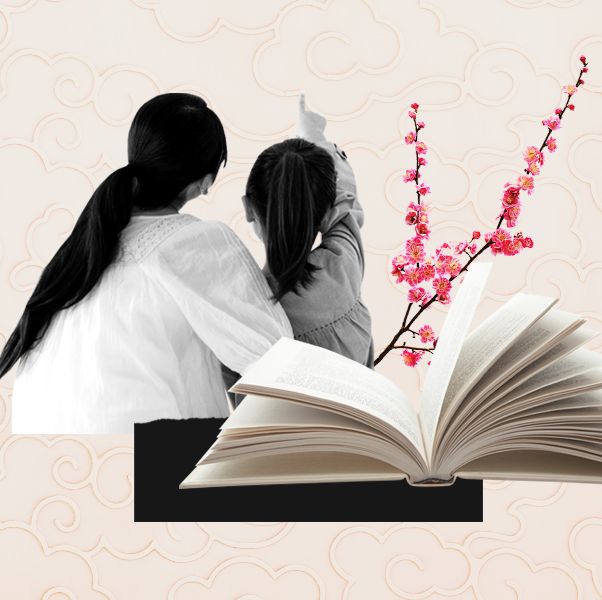"Why can't you read?" It was spring 2020. The interrogator was my daughter, who was three at the time. My parents, Chinese and Taiwanese immigrants who came to the U.S. in the 1970s, had gifted her the picture book Guji Guji by Chih-Yuan Chen, which is about a baby crocodile who believes he's a duck and joins a family of ducks. Hijinks ensue. It's a tale of acceptance, belonging, and family. Though this version contains an English translation crammed onto the last few pages, all the fun illustrations are in the body of the book, where the story is written in Chinese characters.
I'd like to tell you that I could once read the book in its original language, but actually I never could, despite two valiant years of Chinese courses in college. But as a child, I would have understood the story being read to me, say by my parents or grandmother. At my daughter's age and through elementary school, I was bilingual. My parents and maternal grandmother spoke to me almost exclusively in Mandarin. I could carry on my side of the conversation. I didn't feel lost in Mandarin, as I do now.
I can think of no better example of my immigrant daughter language shame than being required to tell my toddler that I can't read Chinese characters, can barely speak Mandarin, that this book would have to be read to her by her grandparents. We'd have to wait until their next visit. After that conversation, I turned down many requests to read Guji Guji at bedtime, sometimes going so far as to hide it behind other books, feeling each time not only like a bad Chinese daughter, but also a bad mother.

 Guji Guji by Chih-Yuan Chen, which is about a baby crocodile who believes he's a duck and joins a family of ducks. Hijinks ensue. It's a tale of acceptance, belonging, and family. Though this version contains an English translation crammed onto the last few pages, all the fun illustrations are in the body of the book, where the story is written in Chinese characters. Guji Guji by Chih-Yuan Chen, which is about a baby crocodile who believes he's a duck and joins a family of ducks. Hijinks ensue. It's a tale of acceptance, belonging, and family. Though this version contains an English translation crammed onto the last few pages, all the fun illustrations are in the body of the book, where the story is written in Chinese characters.
I'd like to tell you that I could once read the book in its original language, but actually I never could, despite two valiant years of Chinese courses in college. But as a child, I would have understood the story being read to me, say by my parents or grandmother. At my daughter's age and through elementary school, I was bilingual. My parents and maternal grandmother spoke to me almost exclusively in Mandarin. I could carry on my side of the conversation. I didn't feel lost in Mandarin, as I do now.
I can think of no better example of my immigrant daughter language shame than being required to tell my toddler that I can't read Chinese characters, can barely speak Mandarin, that this book would have to be read to her by her grandparents. We'd have to wait until their next visit. After that conversation, I turned down many requests to read Guji Guji at bedtime, sometimes going so far as to hide it behind other books, feeling each time not only like a bad Chinese daughter, but also a bad mother." title=""Why can't you read?" It was spring 2020. The interrogator was my daughter, who was three at the time. My parents, Chinese and Taiwanese immigrants who came to the U.S. in the 1970s, had gifted her the picture book Guji Guji by Chih-Yuan Chen, which is about a baby crocodile who believes he's a duck and joins a family of ducks. Hijinks ensue. It's a tale of acceptance, belonging, and family. Though this version contains an English translation crammed onto the last few pages, all the fun illustrations are in the body of the book, where the story is written in Chinese characters.
I'd like to tell you that I could once read the book in its original language, but actually I never could, despite two valiant years of Chinese courses in college. But as a child, I would have understood the story being read to me, say by my parents or grandmother. At my daughter's age and through elementary school, I was bilingual. My parents and maternal grandmother spoke to me almost exclusively in Mandarin. I could carry on my side of the conversation. I didn't feel lost in Mandarin, as I do now.
I can think of no better example of my immigrant daughter language shame than being required to tell my toddler that I can't read Chinese characters, can barely speak Mandarin, that this book would have to be read to her by her grandparents. We'd have to wait until their next visit. After that conversation, I turned down many requests to read Guji Guji at bedtime, sometimes going so far as to hide it behind other books, feeling each time not only like a bad Chinese daughter, but also a bad mother." style="text-decoration: none; -ms-interpolation-mode: bicubic; height: auto; border: 0; width: 390px; max-width: 100%; display: block;" width="390"> "Why can't you read?" It was spring 2020. The interrogator was my daughter, who was three at the time. My parents, Chinese and Taiwanese immigrants who came to the U.S. in the 1970s, had gifted her the picture book Guji Guji by Chih-Yuan Chen, which is about a baby crocodile who believes he's a duck and joins a family of ducks. Hijinks ensue. It's a tale of acceptance, belonging, and family. Though this version contains an English translation crammed onto the last few pages, all the fun illustrations are in the body of the book, where the story is written in Chinese characters.
I'd like to tell you that I could once read the book in its original language, but actually I never could, despite two valiant years of Chinese courses in college. But as a child, I would have understood the story being read to me, say by my parents or grandmother. At my daughter's age and through elementary school, I was bilingual. My parents and maternal grandmother spoke to me almost exclusively in Mandarin. I could carry on my side of the conversation. I didn't feel lost in Mandarin, as I do now.
I can think of no better example of my immigrant daughter language shame than being required to tell my toddler that I can't read Chinese characters, can barely speak Mandarin, that this book would have to be read to her by her grandparents. We'd have to wait until their next visit. After that conversation, I turned down many requests to read Guji Guji at bedtime, sometimes going so far as to hide it behind other books, feeling each time not only like a bad Chinese daughter, but also a bad mother. Her jewelry is a nod to Diana and Elizabeth. "I mean, it's all just happening so quickly," said Fox. |

 Guji Guji by Chih-Yuan Chen, which is about a baby crocodile who believes he's a duck and joins a family of ducks. Hijinks ensue. It's a tale of acceptance, belonging, and family. Though this version contains an English translation crammed onto the last few pages, all the fun illustrations are in the body of the book, where the story is written in Chinese characters.
Guji Guji by Chih-Yuan Chen, which is about a baby crocodile who believes he's a duck and joins a family of ducks. Hijinks ensue. It's a tale of acceptance, belonging, and family. Though this version contains an English translation crammed onto the last few pages, all the fun illustrations are in the body of the book, where the story is written in Chinese characters. 





No comments:
Post a Comment